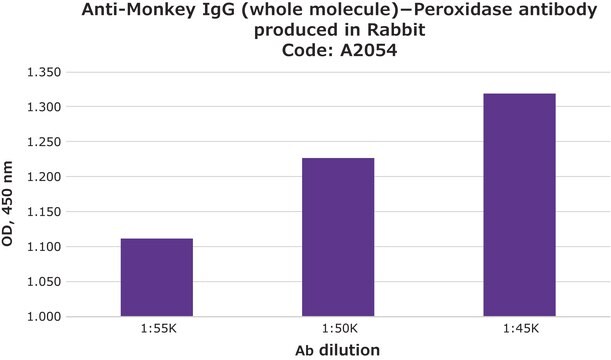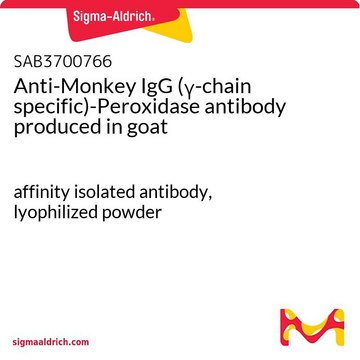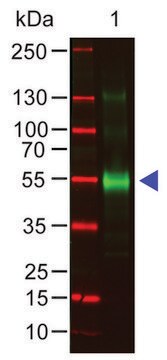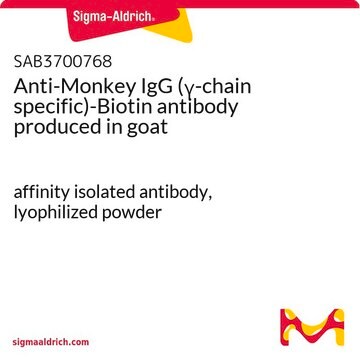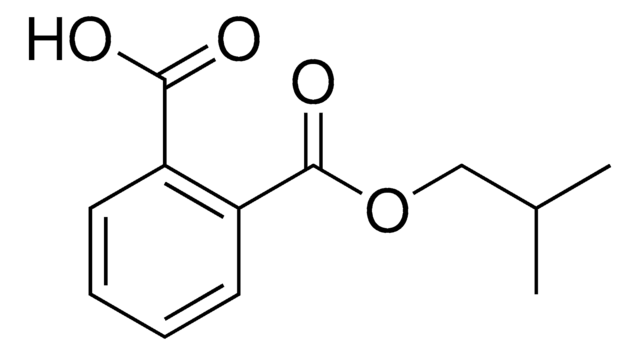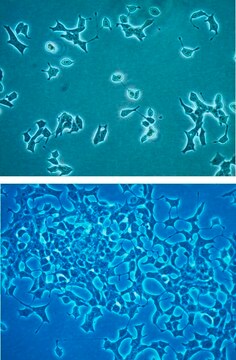A1929
Anti-Monkey IgG (whole molecule)−Alkaline Phosphatase antibody produced in rabbit
affinity isolated antibody, buffered aqueous solution
Synonym(s):
Rabbit Anti-Monkey IgG (whole molecule)−AP
Sign Into View Organizational & Contract Pricing
All Photos(1)
About This Item
Recommended Products
biological source
rabbit
Quality Level
conjugate
alkaline phosphatase conjugate
antibody form
affinity isolated antibody
antibody product type
secondary antibodies
clone
polyclonal
form
buffered aqueous solution
species reactivity
baboon, monkey, marmoset
technique(s)
direct ELISA: 1:40,000
dot blot: 1:60,000 (direct chemiluminescence assay)
shipped in
wet ice
storage temp.
2-8°C
target post-translational modification
unmodified
General description
IgG (immunoglobulin G) antibody subtype is a predominant serum immunoglobulin of the immune system. It is secreted by B cells and is found in blood and extracellular fluids. IgG is found in four subclasses IgG1, IgG2, IgG3 and IgG4. IgG has a monomeric structure.
IgGs are glycoprotein antibodies that modulate several immune responses. Serum IgG levels of rhesus monkeys are comparable to that of men, hence these monkeys are often used as models for studying immunological disorders. Thus, anti-monkey IgGs can be useful tools for the detection and localization of monkey IgGs. Anti-Monkey IgG (whole molecule)-Alkaline Phosphatase antibody binds to monkey, baboon and marmoset IgGs.
Immunogen
Purified monkey IgG (rhesus)
Application
Alkaline phosphatase-conjugated rabbit anti-monkey IgG antibody has been used as a secondary antibody in enzyme linked immunsorbent assay (ELISA) to detect the level of IgG in serum from treated marmoset monkeys. It has also been used for western blot analysis of to identify maternal IgGs in serum from Rhesus monkeys after lentiviral gene transfer.
Biochem/physiol Actions
IgG antibody participates in complement fixation and opsonization.
Physical form
Solution in 0.05 M Tris, pH 8.0, containing 1% bovine serum albumin, 1 mM MgCl2 and 15 mM sodium azide
Disclaimer
Unless otherwise stated in our catalog or other company documentation accompanying the product(s), our products are intended for research use only and are not to be used for any other purpose, which includes but is not limited to, unauthorized commercial uses, in vitro diagnostic uses, ex vivo or in vivo therapeutic uses or any type of consumption or application to humans or animals.
Not finding the right product?
Try our Product Selector Tool.
Storage Class Code
10 - Combustible liquids
WGK
WGK 2
Flash Point(F)
Not applicable
Flash Point(C)
Not applicable
Choose from one of the most recent versions:
Already Own This Product?
Find documentation for the products that you have recently purchased in the Document Library.
Stefano Colloca et al.
Science translational medicine, 4(115), 115ra2-115ra2 (2012-01-06)
Replication-defective adenovirus vectors based on human serotype 5 (Ad5) induce protective immune responses against diverse pathogens and cancer in animal models, as well as elicit robust and sustained cellular immunity in humans. However, most humans have neutralizing antibodies to Ad5
S J Challacombe et al.
Immunology, 36(2), 331-338 (1979-02-01)
Rhesus monkey IgG, IgA and IgM were purified from pooled normal serum and labelled with 125I. Four monkeys were injected intravenously with approximately 50 microgram of each purified immunoglobulin containing between 25 muCi and 50 muCi of 125I. Iodination was
M J Wolfgang et al.
Proceedings of the National Academy of Sciences of the United States of America, 98(19), 10728-10732 (2001-09-13)
Transgenic mice have provided invaluable information about gene function and regulation. However, because of marked differences between rodents and primates, some areas of human biology such as early embryonic development, aging, and maternal-fetal interactions would be best studied in a
L Boon et al.
Journal of immunology (Baltimore, Md. : 1950), 167(5), 2942-2949 (2001-08-18)
Inhibition of CD40-CD40 ligand interaction is a potentially effective approach for treatment of autoimmune diseases, such as multiple sclerosis. We have investigated this concept with a chimeric antagonist anti-human CD40 mAb (ch5D12) in the marmoset monkey experimental autoimmune encephalomyelitis (EAE)
KISS1 over-expression suppresses metastasis of pancreatic adenocarcinoma in a xenograft mouse model.
Lacey R McNally et al.
Clinical & experimental metastasis, 27(8), 591-600 (2010-09-17)
Identifying molecular targets for treatment of pancreatic cancer metastasis is critical due to the high frequency of dissemination prior to diagnosis of this lethal disease. Because the KISS1 metastasis suppressor is expressed at reduced levels in advanced pancreatic cancer, we
Our team of scientists has experience in all areas of research including Life Science, Material Science, Chemical Synthesis, Chromatography, Analytical and many others.
Contact Technical Service